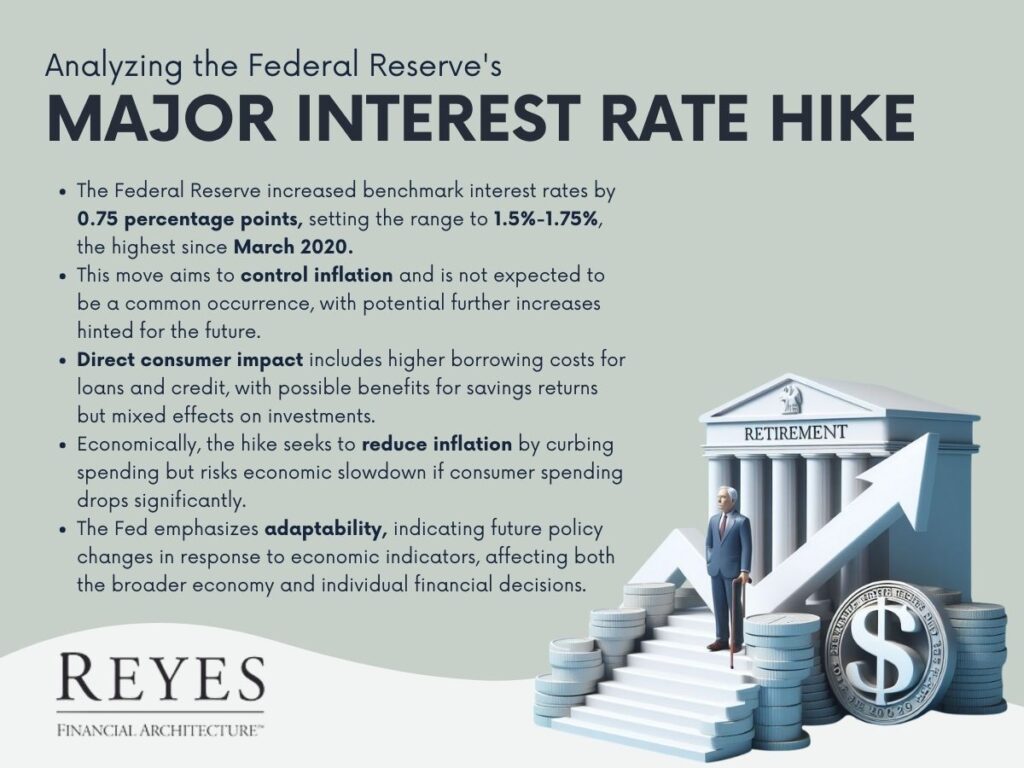The Federal Reserve's decision to implement a substantial interest rate hike, the most significant since 1994, marks a pivotal moment in the U.S. economic landscape. The rate-setting Federal Open Market Committee (FOMC) increased the benchmark interest rates by three-quarters of a percentage point, setting the funds rate to a range of 1.5%-1.75%. This is the highest level seen since just before the Covid pandemic began in March 2020.

The culmination of weeks of speculation, this development immediately impacted the financial markets, with stocks showing volatility before steadying during Fed Chairman Jerome Powell's post-meeting news conference. Powell highlighted that while the 75 basis point increase is notable, such large adjustments are not expected to be routine. He hinted at a potential increase of 50 or 75 basis points in the upcoming July meeting and stressed a 'meeting by meeting' approach in decision-making, promising clear communication.
Powell's remark, "Inflation can’t go down until it flattens out," reveals the Fed's strategic focus on inflation control. The commitment to adjust policies if necessary indicates a proactive and responsive approach to economic challenges.
The hike in interest rates has immediate and significant implications for consumers. Increased interest rates mean higher costs for borrowing, affecting mortgages, personal loans, and credit card debt. Consumers with variable-rate debts or contemplating new loans are likely to experience increased monthly payments and overall borrowing costs.
Additionally, the rate hike can influence savings and investments. Higher interest rates often lead to better returns on savings accounts and fixed-income investments. However, the stock market may react variably, as higher costs can diminish corporate profits, potentially leading to lower stock values.
Economically, the rate increase is designed to mitigate inflation by making borrowing more expensive, thereby reducing spending and easing price pressures. This approach is a fundamental aspect of monetary policy used for inflation control but must be balanced carefully to avoid pushing the economy into recession. A significant reduction in consumer spending, a primary engine of economic growth, could be detrimental.
The backdrop of this policy change is vital to understand. The global economy is still grappling with challenges like supply chain disruptions, labor shortages, and heightened consumer demand, all contributors to the current inflationary trend. Thus, the Fed's decision is part of a broader strategy to stabilize an economy still recovering from the pandemic's impact.
The Federal Reserve's approach in the coming months will be critical and closely monitored. Their commitment to adaptability suggests a readiness to respond to changing economic indicators, potentially leading to additional rate hikes or policy adjustments.
For consumers, it's essential to stay informed, particularly those with variable interest rate debts or those planning significant financial decisions. The effects of these rate changes can be substantial, affecting aspects ranging from mortgage rates to borrowing costs for major purchases.
In summary, the Federal Reserve's recent interest rate hike is a crucial step in its efforts to control inflation and stabilize the post-pandemic economy. While necessary for managing inflation, the effects of these measures will vary across the economy and directly impact consumers. The economic path ahead remains uncertain, with the Fed's forthcoming actions set to play a significant role in shaping the recovery trajectory.